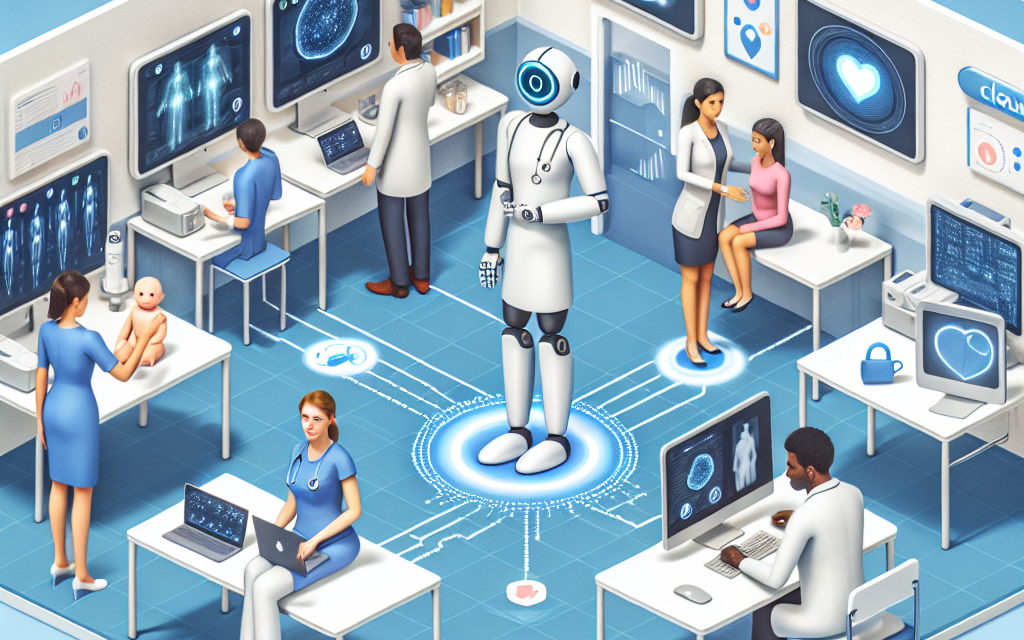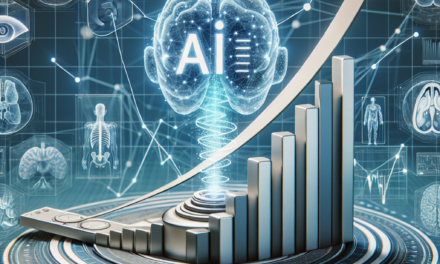Google Cloud Enhances AI Solutions for the Healthcare Sector
The healthcare sector is undergoing a significant transformation, driven by advancements in technology and the increasing demand for efficient, data-driven solutions. Among the key players in this evolution is Google Cloud, which has been at the forefront of integrating artificial intelligence (AI) into healthcare. This article explores how Google Cloud is enhancing AI solutions for the healthcare sector, focusing on five critical areas: data management, predictive analytics, patient engagement, operational efficiency, and regulatory compliance.
1. Data Management: The Backbone of Healthcare AI
Data management is a crucial aspect of healthcare, as it involves the collection, storage, and analysis of vast amounts of patient information. Google Cloud provides robust solutions that enable healthcare organizations to manage their data effectively, ensuring that it is accessible, secure, and compliant with regulations.
One of the primary challenges in healthcare data management is the fragmentation of data across various systems. Google Cloud addresses this issue through its BigQuery platform, which allows healthcare providers to consolidate data from multiple sources into a single, unified repository. This capability is essential for creating a comprehensive view of patient health, enabling better decision-making and improved patient outcomes.
- Interoperability: Google Cloud’s solutions promote interoperability by supporting industry standards such as Fast Healthcare Interoperability Resources (FHIR). This ensures that data can be easily shared between different healthcare systems, facilitating better collaboration among providers.
- Data Security: With the increasing threat of cyberattacks, data security is paramount in healthcare. Google Cloud employs advanced security measures, including encryption and access controls, to protect sensitive patient information.
- Scalability: As healthcare organizations grow, their data needs evolve. Google Cloud’s scalable infrastructure allows organizations to expand their data storage and processing capabilities without significant upfront investments.
For example, the Mayo Clinic has leveraged Google Cloud’s BigQuery to analyze large datasets, leading to insights that have improved patient care and operational efficiency. By integrating data from various sources, the clinic has been able to identify trends and patterns that inform clinical decisions.
2. Predictive Analytics: Anticipating Patient Needs
Predictive analytics is a powerful tool in healthcare, enabling providers to anticipate patient needs and improve outcomes. Google Cloud’s AI and machine learning capabilities allow healthcare organizations to analyze historical data and identify patterns that can inform future care.
One of the most significant applications of predictive analytics in healthcare is in the area of patient risk assessment. By analyzing data such as medical history, demographics, and lifestyle factors, Google Cloud’s AI algorithms can identify patients at high risk for conditions such as diabetes or heart disease. This proactive approach allows healthcare providers to intervene early, potentially preventing serious health issues.
- Clinical Decision Support: Google Cloud’s AI tools can assist clinicians in making informed decisions by providing evidence-based recommendations based on patient data.
- Resource Allocation: Predictive analytics can help healthcare organizations optimize resource allocation by forecasting patient volumes and identifying peak times for services.
- Population Health Management: By analyzing data across populations, healthcare providers can identify trends and implement targeted interventions to improve community health.
A notable example of predictive analytics in action is the partnership between Google Cloud and Ascension, one of the largest healthcare systems in the U.S. Together, they developed a predictive model that identifies patients at risk of developing complications, allowing for timely interventions that improve patient outcomes and reduce costs.
3. Patient Engagement: Enhancing the Patient Experience
Patient engagement is a critical component of modern healthcare, as it directly impacts patient satisfaction and outcomes. Google Cloud’s AI solutions are designed to enhance patient engagement by providing personalized experiences and improving communication between patients and providers.
One of the key features of Google Cloud’s patient engagement solutions is the use of chatbots and virtual assistants. These AI-driven tools can answer patient inquiries, schedule appointments, and provide medication reminders, all of which contribute to a more streamlined patient experience.
- Personalized Communication: Google Cloud’s AI can analyze patient data to tailor communication strategies, ensuring that patients receive relevant information based on their individual needs.
- Telehealth Solutions: With the rise of telehealth, Google Cloud provides tools that facilitate virtual consultations, making it easier for patients to access care from the comfort of their homes.
- Patient Education: AI-driven platforms can deliver educational content to patients, empowering them to take an active role in their health management.
For instance, the use of Google Cloud’s AI-powered chatbots has been implemented by various healthcare organizations to enhance patient engagement. These chatbots can provide instant responses to common questions, reducing the burden on administrative staff and improving patient satisfaction.
4. Operational Efficiency: Streamlining Healthcare Processes
Operational efficiency is essential for healthcare organizations to deliver high-quality care while managing costs. Google Cloud’s AI solutions help streamline various processes, from administrative tasks to clinical workflows, ultimately improving overall efficiency.
One area where Google Cloud has made significant strides is in automating administrative tasks. By leveraging AI, healthcare organizations can reduce the time spent on repetitive tasks such as billing, coding, and scheduling. This automation not only saves time but also minimizes the risk of human error.
- Workflow Optimization: Google Cloud’s AI tools can analyze workflows to identify bottlenecks and recommend improvements, leading to more efficient operations.
- Supply Chain Management: AI can optimize inventory management by predicting demand for medical supplies, ensuring that healthcare organizations have the necessary resources on hand.
- Staffing Solutions: Predictive analytics can help organizations forecast staffing needs based on patient volumes, allowing for better workforce management.
A case study highlighting operational efficiency is the collaboration between Google Cloud and the University of California, San Francisco (UCSF). By implementing AI-driven solutions, UCSF was able to streamline its administrative processes, resulting in significant cost savings and improved patient care delivery.
5. Regulatory Compliance: Navigating Complex Regulations
Compliance with healthcare regulations is a critical concern for organizations in the sector. Google Cloud provides tools and resources that help healthcare providers navigate the complex landscape of regulations, ensuring that they remain compliant while leveraging AI solutions.
One of the key challenges in regulatory compliance is maintaining patient privacy and data security. Google Cloud’s infrastructure is designed with compliance in mind, offering features such as data encryption and access controls that align with regulations like the Health Insurance Portability and Accountability Act (HIPAA).
- Audit Trails: Google Cloud’s solutions provide detailed audit trails that help organizations track data access and modifications, which is essential for compliance reporting.
- Training and Resources: Google Cloud offers training programs and resources to help healthcare organizations understand and implement compliance best practices.
- Collaboration with Regulatory Bodies: Google Cloud actively collaborates with regulatory bodies to ensure that its solutions meet the latest compliance standards.
An example of Google Cloud’s commitment to regulatory compliance is its partnership with various healthcare organizations to develop best practices for data management and security. By providing guidance and resources, Google Cloud helps organizations navigate the complexities of compliance while harnessing the power of AI.
Conclusion: The Future of Healthcare with Google Cloud AI Solutions
Google Cloud is playing a pivotal role in enhancing AI solutions for the healthcare sector, addressing critical challenges such as data management, predictive analytics, patient engagement, operational efficiency, and regulatory compliance. By leveraging advanced technologies, healthcare organizations can improve patient outcomes, streamline operations, and navigate the complexities of the regulatory landscape.
As the healthcare sector continues to evolve, the integration of AI solutions will become increasingly important. Google Cloud’s commitment to innovation and collaboration positions it as a leader in this transformation, paving the way for a future where technology and healthcare work hand in hand to deliver better care for patients worldwide.
In summary, the advancements made by Google Cloud in AI solutions for healthcare not only enhance operational efficiency but also empower healthcare providers to deliver personalized, data-driven care. As organizations continue to adopt these technologies, the potential for improved patient outcomes and streamlined processes will only grow, marking a new era in healthcare.





